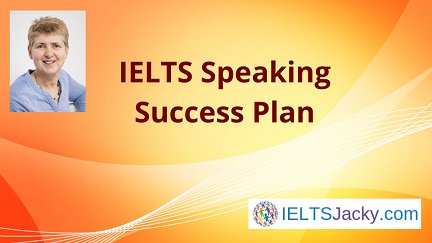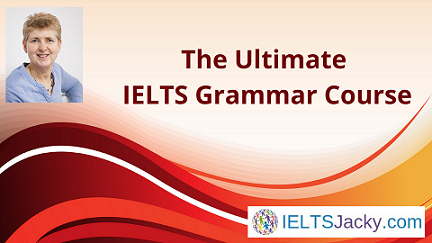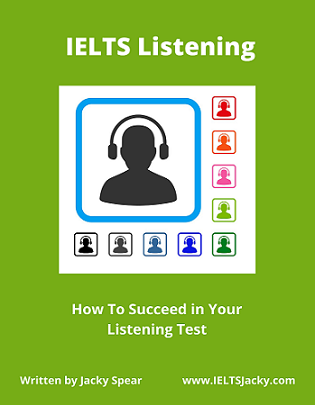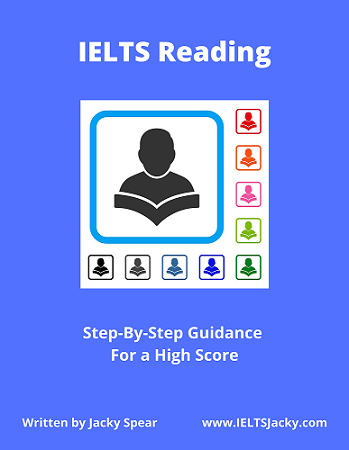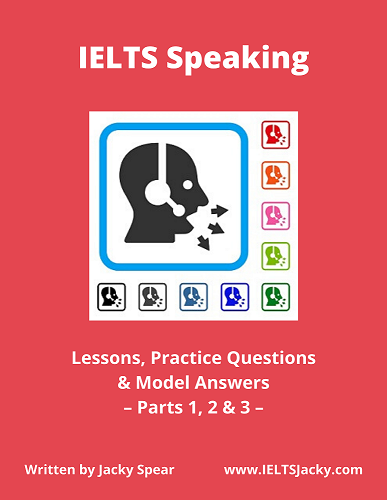IELTS Listening
Note Completion Practice
Note completion
questions come up regularly in the IELTS Listening exam so there’s a high
chance of you getting one in your test.
They can take many different forms but will always be a gap fill activity of some sort where you have to fill in missing words. You could, for example, be asked to fill in missing words in a set of notes from a lecture or a list of instructions for a journey.
There are almost endless possibilities but as long as you have a good strategy to follow, you’ll be able to answer any question you’re given. Follow the advice in this lesson and you’ll be well prepared.
The lesson includes:
- What are notes?
- Sample questions
- Strategy & tips
- Practice question
- Answers
What are
notes?
As an English language student, you probably make notes on a regular basis. It’s also common to make notes, for example, during meetings and telephone conversations or when browsing the internet for information on a particular topic, such as travel information for a holiday.
So, what sort of information do you write down when you’re taking notes? And, what do you not write down?
Notes contain:
- Key word & phrases
- The minimum vocabulary necessary for the information to make sense to the writer
They frequently include:
- Lists
- Headings & subheadings
- Numbers or bullet points
Notes don’t generally contain full sentences and are often ungrammatical.
Sample
questions
Here are two note completion questions from past IELTS Listening papers.
IELTS Listening Note Completion - Sample Question 1
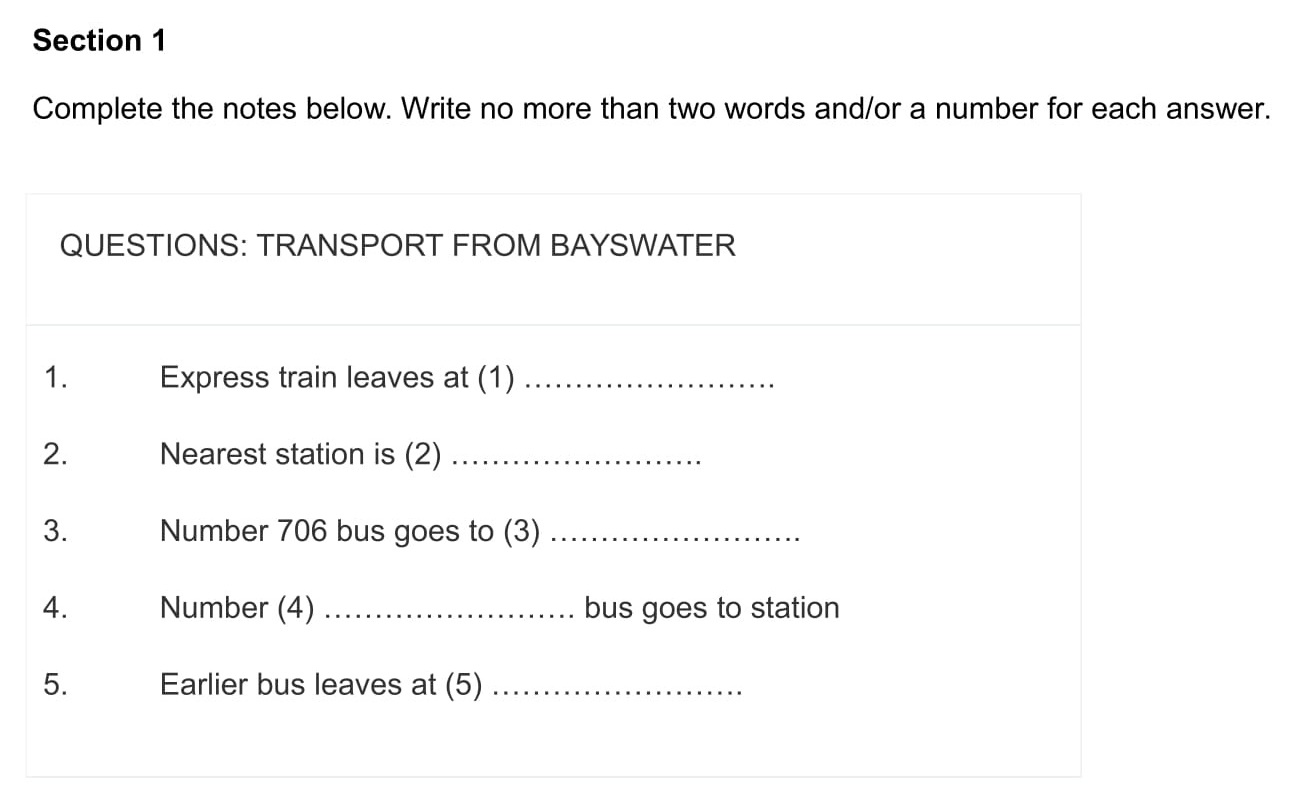
Source: British Council website
The recording for this sample question is a telephone conversation between a clerk at the enquiry desk of a transport company and a man who is asking for travel information. You are required to fill in the missing information about travel options by bus and train from Bayswater to Harbour City.
IELTS Listening Note Completion - Sample Question 2
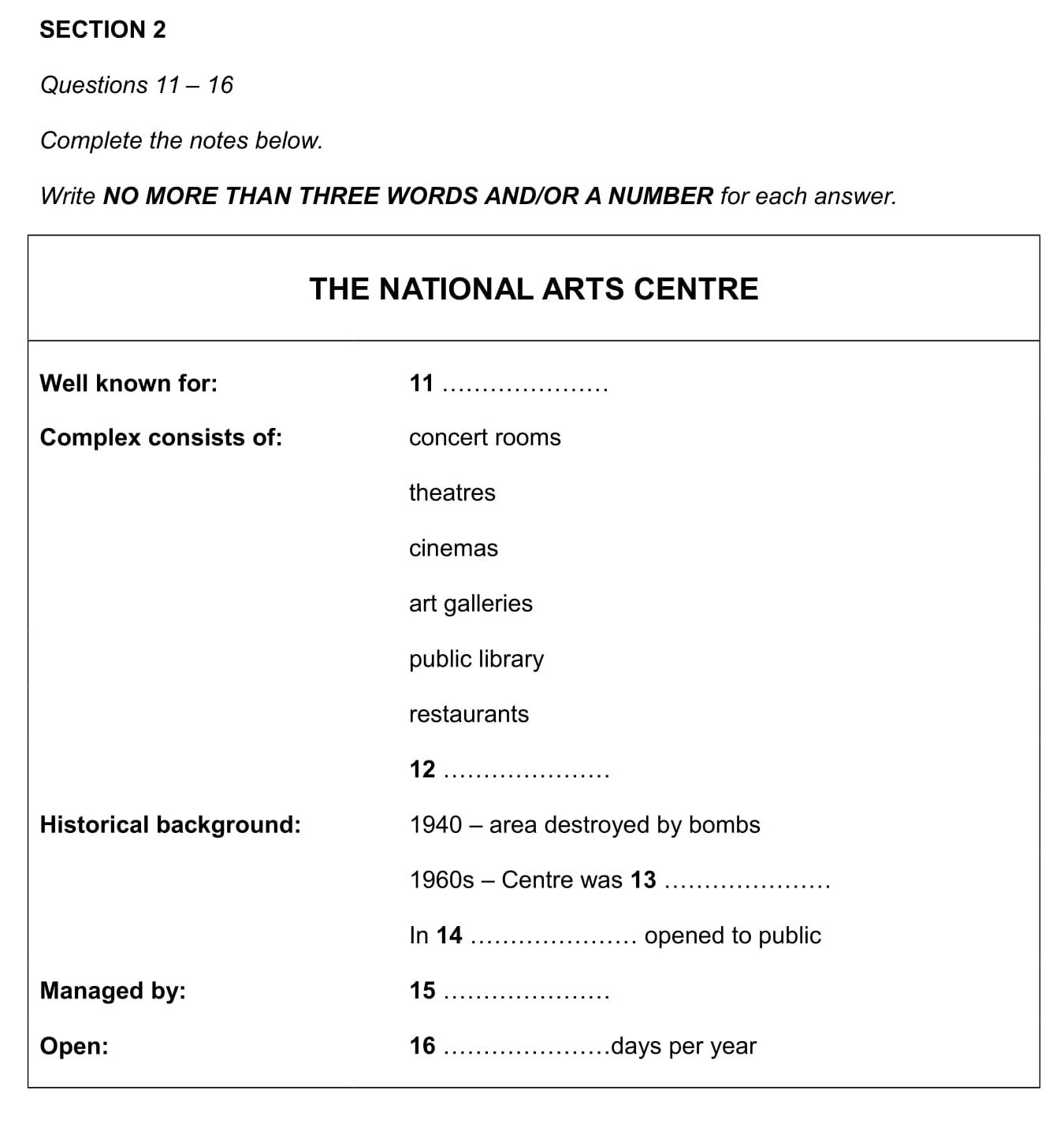
Source: Cambridge English test paper
The recording for this sample question is a radio broadcast about The National Arts Centre. You are required to fill in six pieces of missing information about the centre.
I’m going to use this second example to teach you the answer strategy and give you tips and advice on how to overcome the challenges presented by this type of question.
Strategy & Tips
You will have a short time to prepare before the speaker begins talking. Use this time to familiarise yourself with the question and focus your mind on what you need to listen out for.
1) Read the instructions
Read the instruction carefully, paying particular attention to how many words you are allowed to write for the answer.
The instructions for our sample question state that you must,
Write NO MORE THAN THREE WORDS AND/OR A NUMBER for each answer.
If you write more than three words, your answer will be marked incorrect even if the information you give is correct. Don’t lose marks over silly mistakes like this.
The answers to note completion questions will usually be factual information such as names, places, dates, times and phone numbers.
2) Look for a title
Not every question will have a title but if there is one, it
will tell you the context of the question. Our sample question has the title ‘The
National Arts Centre’.
Knowing the context gives some meaning to the information in the notes. This will help you to understand the question and give you a big clue as to what sort of information will be contained in the recording.
3) Predict
the answers
Try to predict what the answers might be. This will focus your mind on what to listen out for in the recording.
Occasionally, you’ll be able to predict the actual word but mostly it’s one or more of these things that you’ll be able to determine:
- The type of information required, e.g. surname, place name, date, phone number, postcode, percentage, price.
- The type of word required, e.g. noun, adjective, verb.
Any clues you can get will help you to understand the audio and identify the information needed for the answers.
Have a go at predicting some of the answers in our note completion practice question. There are 6 answers to fill in, 11-16. Then have a look at my predictions below.
Here are the notes with the missing information.
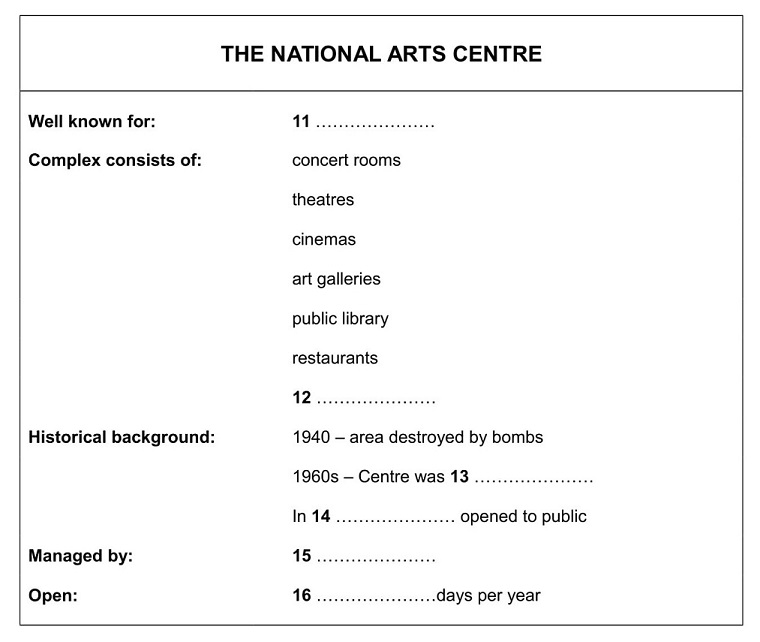
Predictions:
11 – ?
12 – the name of a room or facility
13 – a verb in the past tense
14 – a date
15 – the name of a business or organization
16 – a number
You can see that just a few seconds spent doing this can give you a lot of information about what you need to listen for in the recording. This will greatly improve your chances of identifying the correct answers.
4) Synonyms and paraphrasing
In all types of Listening questions, you need to listen out for synonyms and paraphrasing. These are something else that you may be able to predict.
If you have time before the recording starts, scan the question to identify key words or phrases that are likely to be replaced by synonyms and think of some that might be used.
Three that stand out are:
- opened to the public
- managed by
- days per year
As you’re listening to the recording, remind yourself that you are not looking for the exact words as in the question but the same meaning.
5) Answer order
The answers will come in the same order in the recording as they are listed in the question so, you will hear answer 11 first, then answer 12 and so on. This makes it easier to pick out the answers than if they were in a random order.
6) Problematic vocabulary
There are 6 types of vocabulary that can cause particular problems for students and some of them will almost certainly be present in notes completion questions. The 6 types are:
- Time
- Numbers
- Prices
- Dates
- Letters
- Addresses
You must be able to recognise them in speech and to write them correctly in your answers.
I’ve written a whole lesson on this topic, including 8 listening exercises to help you recognise & learn these types of vocabulary. Follow this link to the lesson: Vocabulary Lesson & Exercises
7) Watch out for distractors
The examiners will try and catch you out with distractors. A distractor is a word or a phrase that changes or corrects the original piece of information given. So, you may be given an answer and then have it taken away again.
Here are some sample sentences containing distractors. I’ve highlighted the relevant words.
- The Centre has always been famous for its theatrical productions but in recent years it has become better known for operatic performances.
- In the original design of the building, there was a sculpture hall next to the art galleries. However, the plans were changed to include a studio for visiting performers to run workshops.
- The first visitors were welcomed in July 1983. No, sorry. That’s when the Centre was completed. It wasn’t open to the public until September of that year.
The use of ‘but’ and ‘however’ are particularly common distractors but there are many different words and phrases that can be used to change or correct a piece of information so be alert for them.
8) Guess if necessary
My final tip is to never leave a blank space on the answer sheet. If you miss an answer, take an educated guess. This gives you at least some chance of getting it right. Don’t stress about a missed answer or it will affect your ability to answer the next set of questions. Just make your choice and move on.
Practice Activity
It’s now time for you to practice using this strategy on our
sample question. Here it is again.
Sample note completion question

Listen to this recording and answer the question.
Refer back to the strategy as you need to and keep the predictions in mind. When you’ve completed the practice activity, go through the answers below.
IELTS Listening Note Completion Practice – National Arts Centre Recording
There is a pause between the introduction and the speaker beginning the talk to give you time to study the question as will happen in the real exam.
Source: Official IELTS website www.ieltsessential.com
Answers
Here are the
correct answers. The words in brackets are optional.
Answers:
11 classical music (concerts)
12 (a) bookshop
13 planned
14 1983 / (the) 1980’s
15 (the) City Council
16 363
We’ll now look at them in context and examine the language that has been used, especially synonyms and paraphrasing.
Answer 11: classical music (concerts)
Here’s the sentence this answer appears in:
It’s famous throughout the world as one of the major venues for classical music.
Synonym used: well known à famous
Answer 12: (a) bookshop
Here’s the sentence this answer appears in:
Under a single roof, it houses concerts rooms, theatres, cinemas, art galleries and a wonderful public library as well as service facilities including three restaurants and a bookshop.
This is an easy answer to identify as the facilities are listed in the same order as they appear in the questions, with the missing item, a bookshop, added onto the end.
Answer 13: planned
Here’s the sentence this answer appears in:
Of course, it took a while for such a big project to get started but it was planned in the '60s, built in the '70s and eventually opened to the public in 1983.
The challenge with this answer is knowing that ‘the '60s’ means ‘the 1960s’, that is, the decade between 1960 and 1970. I cover vocabulary relating to dates in the lesson on problematic language that I mentioned earlier.
Answer 14: 1983 / (the) 1980’s
This answer appears in the same sentence as the last one.
Of course, it took a while for such a big project to get started, but it was planned in the '60s, built in the '70s and eventually opened to the public in 1983.
The examiners have been kind with this question as the speaker repeats the phrase ‘opened to the public’ as it is written in the notes rather than paraphrasing it.
‘1980s’ or ‘the 1980s’ would also be acceptable as the answer.
Answer 15: (the) City Council
Here’s the sentence this answer appears in:
Ever since then, it has proved to be a great success. It’s not privately owned like many Arts Centres but is still in public hands. It’s run by the City Council.
Synonym used: managed by à run by
‘City Council’ is a proper noun so both words must start with a capital letter. If you don’t use capitals, your answer will be marked wrong.
If you're concerned that you'll forget, write all your answers for the Listening test in capital letters.
Answer 16: 363
Here’s the sentence this answer appears in:
And, as the Centre is open 363 days of the year, there are plenty of performances to choose from.
This answer is paraphrased but is close enough to what the speaker says that it shouldn’t have caused you too much of a problem.
Paraphrasing: days per year à days of the year
If you got any of the answers wrong, listen to the recording again and see if you can pick them out now that you’re more familiar with the text.
I hope you’ve found this lesson helpful. Now practice using this strategy to do some note completion practice with other past questions. It’s only with practice that your skills will improve and you’ll get the score you need in your IELTS Listening test.
You'll find lessons on how to answer other types of Listening questions in the menu below.
Want to watch & listen to this lesson on note completion questions?
Click on this video.
Like this page?
IELTS Listening – All Lessons
IELTS Listening Test – Understand the format & question types. Know what skills are assessed. Also, discover 3 important marking tips.
Listening Strategies – Learn 3 essential listening strategies – question analysis, answer prediction & how to use keyword clues.
Listening Skills – Learn the 4 key listening skills needed for a high score highly. Examples from real questions.
Listening Exercises – 8 listening exercises to help you recognise & learn vocabulary for 6 common topics – time, numbers, prices, dates, letter names & addresses.
The 10 Question Types – Examples of all 10 types of Listening questions. Learn how to recognise & understand them. Links to 10 step-by-step lessons.
Listening Tips – Top 10 tips to bring you success in your Listening test. Essential information you need to know to achieve a high score.
How to Improve Your Listening Skills – 6 simple strategies essential for achieving a high score in the test.
Listening Practice – 4 practice techniques to develop your listening skills
Map & Plan Vocabulary – Learn the vocabulary you need for your test. 5 maps & plans with sample sentences containing common vocabulary of location & direction.
Listening Practice Samples – Short activities to improve your listening skills & help you learn topic vocabulary.
Genuine Full Practice Tests:
The 10 Question Types
Click the links below to learn how to answer each type of question.



